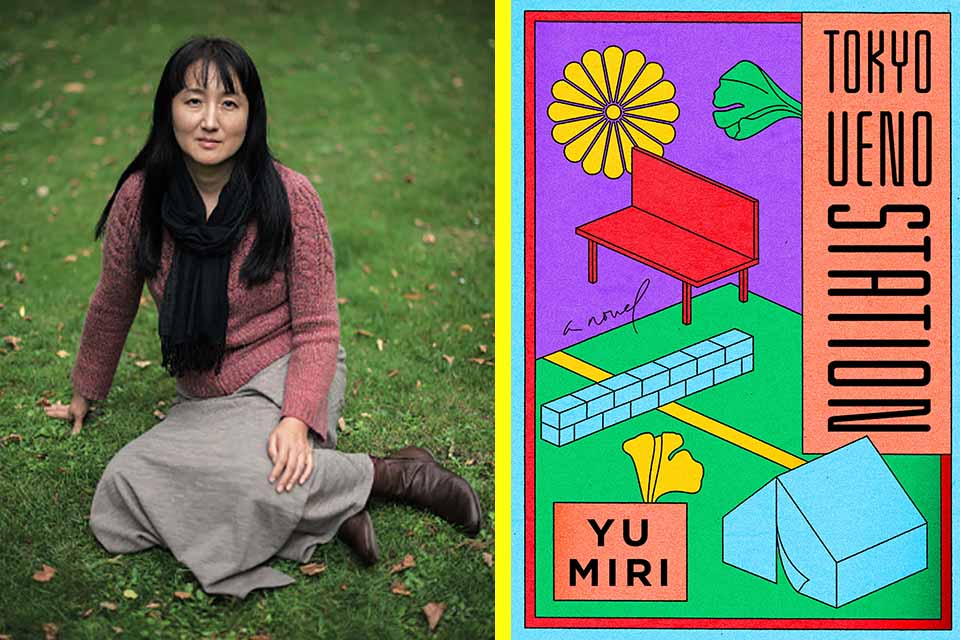Yu Miri first started researching the evictions of the homeless community in Tokyo’s Ueno Park back in 2006. Days or even hours before visits by the emperor and the imperial family, eviction notices would be pasted to their tarpaulin huts, instructing them to dismantle the huts, clear away their belongings, and move out. Many of those living homeless in the park’s tent village had originally come from the Tōhoku region (Japan’s Northeast) to find work and had ended up staying in the capital. In the wake of the Tōhoku earthquake and tsunami on March 11, 2011 (3/11), Yu began to commute to the city of Minamisoma in Fukushima where she worked for an emergency radio station. She interviewed over four hundred residents about the disaster and about their town before the tragedy. She has since moved permanently to Minamisoma. Her novel—Tokyo Ueno Station (Riverhead, 2020), translated by Morgan Giles—testifies to the breadth and depth of her research and her commitment to telling the stories of both the homeless community in Ueno Park and from Tōhoku, where, in spite of the events of 3/11, some feel that their ongoing struggles have been deprioritized in favor of Japan’s Olympic dreams.
We first meet Kazu, the protagonist of the novel, as he returns to his former haunts in Ueno Park, where he lived, until recently, as part of the homeless community. Originally from a village in Fukushima Province, Kazu recalls how, in order to save his young family from falling further into debt, he traveled to Tokyo with other construction workers ahead of the 1964 Olympics, first arriving in Ueno Station. A series of personal tragedies led him to return to Ueno Park in his old age, where he started sleeping in the tent-village near the station exit. The book is full of sounds of other people’s voices, which translator Morgan Giles renders sensitively and inventively in English, from arguments in the homeless community to the grumbling of businessmen and the “chi chi, chirrup” of birds. As he traces the story of his life, searching for clues as to how he disappeared, Kazu does battle with one sound in particular—“… that sound, like blood coursing—like a vivid current flowing”—a sound he isn’t sure is inside or outside his own head. It sounds like the hammering, squealing racket of an approaching train.
Kazu seems to be on a kind of collision course with the emperor of Japan, a man who is the same age as him, whose son, the crown prince—who was crowned emperor in May 2019—shares a birthday with Kazu’s own son, Kōichi. Despite chance encounters, and the strange coincidences that connect Kazu and the emperor, there are unbridgeable differences between the emperor—a man without sin, without shame—and the taciturn, downtrodden Kazu, whose poverty is described as “a wage which one could not endure, leading one to sin again, and as long as one could not pull oneself out of poverty, the cycle would repeat until death.” Between these two extremes, the novel unravels the myth of Japan’s homogeneity and encourages readers to see how Japanese society deals with differences, including those habitually concealed.
Yu Miri’s novel unravels the myth of Japan’s homogeneity and encourages readers to see how Japanese society deals with differences, including those habitually concealed.
Kazu’s memories expose everyday acts of violence enacted by the state on both homeless people and historically on people in Tōhoku, acts of labeling and leafleting that insist on silent compliance. Ten days before the birth of Kazu’s son, Kōichi, officials from the tax office “trampled through our house, attaching red slips of paper to almost everything.” Then there are the messages from park authorities—“Fishing Prohibited – City of Tokyo”; “Please keep off the grass”—attempts to make Ueno Park a hostile environment for homeless people. Kazu reads the words from one sign just outside the park, the likely cause behind the most recent evictions:
Japan needs the power of dreams, now more than ever. Bring the 2020 Olympics and Paralympics to Japan!
Even once Japan and the rest of the world are on the other side of this current crisis, and we welcome the 2021 Olympic Games with relief and gratitude, we cannot afford not to hear Yu’s powerful critique of this dangerous illusion: “the power of dreams.” It is an illusion that sees Japan’s homeless community as collateral and has drawn workers away from vital reconstruction work in Tōhoku to build stadiums for the world’s best athletes for the world’s wealthiest to watch in the comfort of their own homes.
Leipzig, Germany
